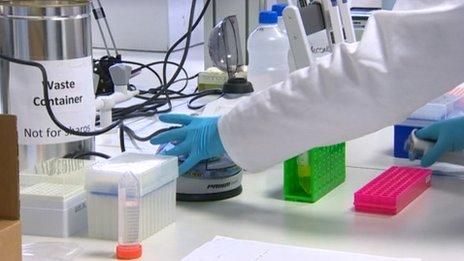Cardiff University 'superstar' £30m science centre opens
- Published
The new facility will focus on cancer and mental health research
A £30m new medical science centre will bring together some of Wales' most eminent scientists under the same roof at Cardiff University.
The Hadyn Ellis building has been officially opened by the economy and science minister Edwina Hart.
The new facility will focus on cancer and mental health research.
It will see world-leading experts in conditions like Alzheimer's disease and stem cell cancer research working together for the first time.
"In this building we create a critical mass of joint expertise - and that takes you to other levels," said Prof Julie Williams, who recently helped discover 11 new genes associated with Alzheimer's.
"You really can do big science when you get the scientists together. We still have the capacity to grow much bigger.
"Wales is a small nation but we can do some things very well and I think we can do that in this building."
Dr Richard Clarkson, a senior lecturer at the European Cancer Stem Cell Institute, said the new centre would boost their work in this new field of discovery.
"The scientists here are trying to find out where these cells come from, how we can identify them and separate them from the rest of the tumour because its only these cells we think are responsible for the spread of the disease," he said.
"This centre will also provide a nurturing incubator environment for early stage career scientists, the really hot new scientists that are coming into the field. Those showing really good potential already.
"We can really put Cardiff and Wales on the map here."

Work on projects examining cancer stem cells are already under way at the centre
The new centre has been named in honour of the late deputy vice chancellor of the university, pioneering cognitive psychologist and a strong advocate of scientific co-operation, Prof Hadyn Ellis.
The building will also be a base for NHS clinics where patients and volunteers can take part in medical research.
"It's all about getting people to come to help with this research, to come along be interviewees, give blood samples, and allow us to know about their experience of illnesses," explained Prof Nick Craddock, who is the director of the National Centre for Mental Health.
He is working on major research into conditions such as ADHD and autism in children, depression and bi-polar disorders in adults, and dementia in the elderly.
"Having everybody work together with their different perspectives and understanding is absolutely vital," he added.
"So having a mathematician talking to a psychologist, and a geneticist talking to a sociologist is absolutely crucial in making an impact on those very complex problems our patients have."
Officially opening the building, the economy and science minister Edwina Hart said: "What makes the building is not this - at the end of the day, bricks and mortar - it is the people that are in it.
"For me that is the exciting thing about the building, with the ideas coming together, the conversations that might take place in the corridor."
She said the new venture was not just about the economic prosperity of Wales, but also about what a centre such as the Hadyn Ellis building could achieve for those living in Wales.
"What's going to come out to help their lives? Their families? What treatments are going to emerge?" said the minister.
"So this is what it is all about, about bringing it all together."
- Published28 September 2013
- Published10 September 2013
- Published22 July 2013
- Published17 June 2013
- Published12 March 2012